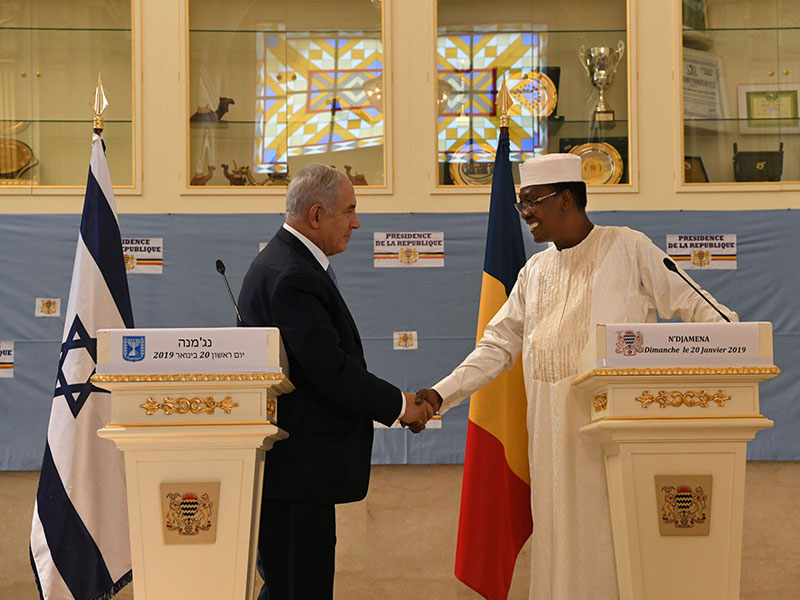 Israeli Prime Minister Benjamin Netanyahu and Chad President Idriss Deby met last month. |
The warming acceptance for Israel also extends to Africa.
Israel has a card to play, especially in the Sahel – an arc of land immediately south of the Sahara Desert and stretching across the African continent. Terrorism from jihadist groups such as Islamic State, al-Qaida in the Islamic Maghreb and Boko Haram, has become a top priority for countries there, such as Mali, Niger, Chad, Burkina Faso and Nigeria.
Security needs seemed to be part of the agenda a year ago, when Benjamin Netanyahu re-established diplomatic ties with Chad and became the first Israeli prime minister to visit the country.
"There is a lot that we can do together," Netanyahu said, "and we discussed how to deepen our cooperation in every field beginning with security, but also agriculture, food, water, energy, health and many more. And I believe that this cooperation will build a better, safer and more prosperous future for both our peoples."
After restoring diplomatic ties, Israel did not waste any time sending in large business delegations to capitalize on the opening to a new market for Israeli industry and services.
Israel's most recent breakthrough came Feb. 3, when Netanyahu held a "secret" meeting in Uganda with Sudan's leader, Abdel Fattah al-Burhan. Al-Burhan did not inform his own government about the meeting for fear he would have been pressured to cancel. Sudan is trying to persuade the United States to remove it from its list of state terrorism sponsors, and al-Burhan's restoration of ties with a key U.S. ally might help.
The United Arab Emirates, recently the most active ally in the Arab world to open doors for Israel in the Muslim world, helped set up the meeting.
Uganda's role as the meeting's host also highlights the close cooperation between it and Israel. For proof, a Lebanese Hizballah agent was arrested in Entebbe last July in a joint Uganda-Israel operation. Hizballah had instructed him to identify possible American and Israeli targets in Uganda and the region, and recruit Lebanese living in Uganda for Hizballah operations, from terrorism to funding to intelligence gathering.
Israel has had a long friendship history with Cameroon President Paul Biya, advising him for decades on communication interception technology and physical security. Israel also set up the Rapid Intervention Battalion that is central to Cameroon's security and continues to train its elite troops. Interestingly, the good relations did not prevent an anti-Semitic rant last year by a Cameroonian minister who declared that the extermination of the Jews by Nazi Germany was due to their "arrogance." The Cameroonian government quickly condemned the minister's statement.
Meanwhile, Rwanda is home to a new Israeli embassy, its 11th in Africa. The two countries cooperate in agriculture, technology and security. For example, Israel's Foreign Agency, through its international development cooperation arm, MASHAV, built an agricultural center of excellence in Rwanda.
Through the center, "hundreds of farmers and people who are dealing in agriculture in Rwanda will be trained and they are going to be in position to have by far more quality, by far more quantity, and above all, it is going to bring more income to the people," Yuval Rotem, the Israeli Ministry of Affairs director general, told a Rwandan news outlet.
Last but not least, Morocco, an Arab country, has had historically a close relationship with Israel because of its large Jewish community. For proof, the mind-boggling revelations three years ago that Israel largely has Morocco to thank for its victory in the 1967 Six-Day War. Morocco's King Hassan ll passed recordings to Israel in 1965 of a key meeting between Arab leaders discussing whether they were prepared for war against Israel.
But the two countries do not have formal diplomatic relations.
When the Muslim Brotherhood's PJD party won control of parliament in 2011, it pushed a hardcore line against Israel and made the Palestinian issue a top priority. Since then it is difficult for any Moroccans to express any support for the Jewish State or visit it: a Moroccan journalist explained during a visit to Israel that showing any kind of support for Israel or even visiting the country can result in ostracization and even death threats.
For example, when a Moroccan radio station, Medi1, had the courage last year on its website to describe a Palestinian who killed two Israeli soldiers as a terrorist, it had to change the headline under pressure. To alleviate this Islamist aggressive behavior toward Israel, King Mohamed VI, following the tradition of his father and grandfather, has kept a friendly and amicable attitude towards Israel. Now there are reports that Morocco would normalize relations with Israel in exchange for U.S.-recognition of Moroccan sovereignty in the occupied Western Sahara.
There remains a lot of bad blood toward Israel in Africa. South Africa recalled its ambassador to Israel in 2018 and last year downgraded diplomatic relations further in protest of Israel's response to violent, Hamas-orchestrated demonstrations at the Gaza border.
But the trend towards a warming relationship between some countries on the continent and the Jewish State is quite hopeful.
Olivier Guitta is the Managing Director of GlobalStrat, a security and geopolitical risk consulting company for companies and governments. Olivier tweets @OlivierGuitta.
